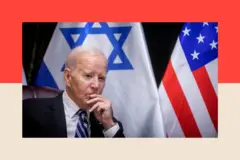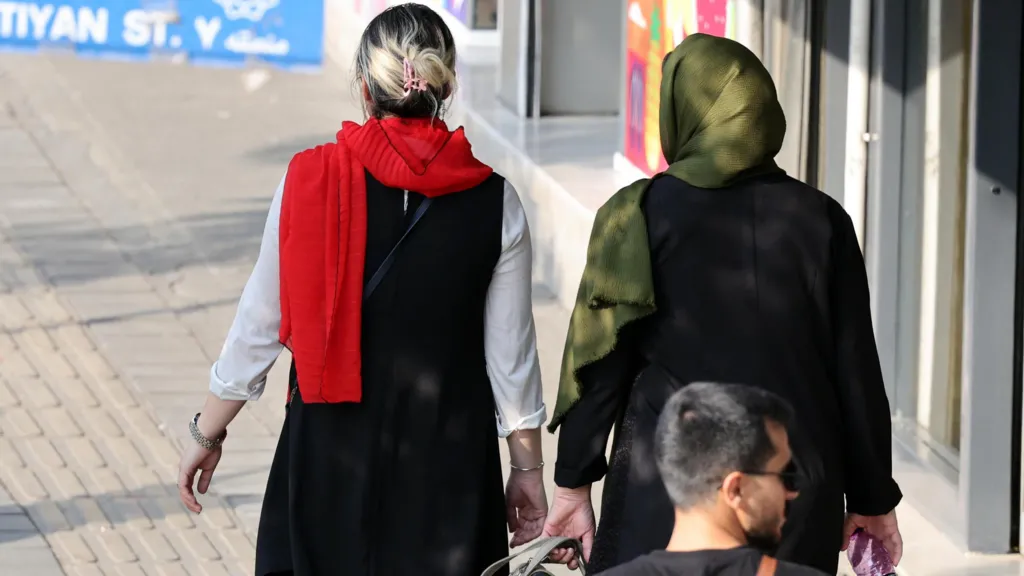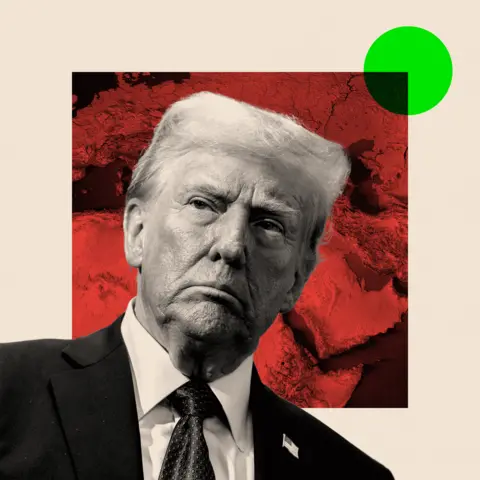 BBC
BBCDonald Trump has made an impact on the Middle East even before he sits down in the Oval Office to start his second term as president.
He cut through the delaying tactics that Israel’s Prime Minister Benjamin Netanyahu, in alliance with his ultra-nationalist coalition partners, had used to avoid accepting the ceasefire deal that Joe Biden put on the negotiating table last May.
American pressure on Hamas and other Palestinian groups is a given. Under Biden, pressure on Israel was the lever that was never pulled. Trump starts his second term claiming credit, with reasonable justification, for getting the ceasefire deal in Gaza over the line. He can bask in some glory.
Netanyahu, on the other hand, is dealing with a coalition crisis. The entire principle of doing a deal with Hamas is repugnant to the ultra-nationalist politicians who have supported his government.
One of them, the National Security Minister Itamar Ben-Gvir says his party, Jewish Power, will only support the government if it resumes the war, cuts off all aid to Gaza and destroys Hamas. If that does not happen, he will resign.
That will be of no importance to Donald Trump. The push for a Gaza ceasefire demonstrated that Trump would put the interests of his presidency before the political requirements of Israel’s prime minister.
 Getty Images
Getty ImagesJoe Biden, on the other hand, was prepared to risk votes in swing states in the US presidential election because of his determination to support Israel, despite his own misgivings about the way that Israel was killing civilians in Gaza and depriving them of food, medical care, shelter and clean water.
Israel’s nationalist right was delighted when Trump won his landslide victory in November. They assumed that Trump would give them even more licence than Biden had. The reality might be more complicated than that.
Just as Israel is not the same country that Trump left behind when he left office in 2021, Trump may not be the president that they encountered the first time around.
The split-screen moment
The first signs of how Trump would approach the Middle East as president – and the conclusion to draw from it – came on a hot early summer day during Trump’s second year as president.
If you live outside Israel and the occupied Palestinian territories, you can be forgiven if you don’t remember the events of that day – 14 May 2018. After all the terrible bloodshed since Hamas attacked Israel on 7 October 2023, specific days that led up to the war in Gaza can be easily forgotten.
But in a world where most people get their news online, it was also declared to be the ultimate split-screen moment.
On one side of the news feeds was the Trump administration’s most photogenic couple, the first daughter Ivanka, and her husband Jared Kushner who was also the president’s senior adviser. They were opening the new American embassy in Jerusalem.
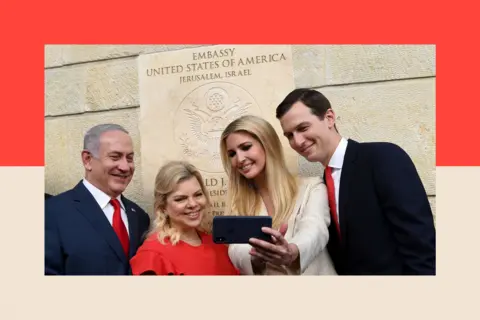 Getty Images
Getty ImagesMoving it from Tel Aviv and recognising Jerusalem as Israel’s capital was one of Trump’s campaign promises, aimed mostly at evangelical Christians who made up a big share of his electoral base.
For the delighted audience of Israeli politicians and wealthy American donors to Donald Trump and Israel, Ivanka and Jared’s presence was the icing on a long overdue cake.
On the other side of the screen Israeli soldiers were shooting into Gaza to kill and wound Palestinians who were trying to break through the border fence.
Between 50 and 60 Palestinians were killed that day. Many more suffered gruesome bullet wounds.
 Getty Images
Getty ImagesIt was the culmination of an event that Hamas, Gaza’s rulers, had called the “Great March of Return”. Thousands were taking part.
Small groups, mostly young men, were advancing on the wire. About a kilometre back were thousands of peaceful demonstrators. Families were picnicking on the sand. They screamed and fled when Israeli drones bombed them with tear gas.
Hamas commanders must have concluded it would take more than mass protest to break into Israel.
On 7 October 2023, in a much bigger and better planned assault that took Israel by surprise, Hamas breached the border. Its men killed around 1,200 people, mostly Israeli civilians, and took 251 others into Gaza as hostages.
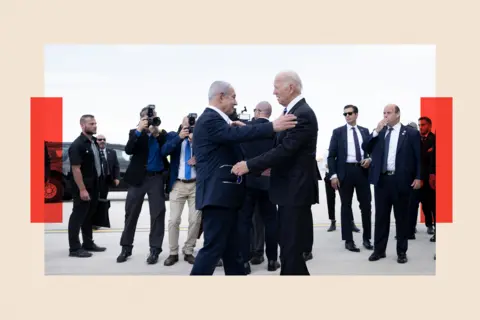 Getty Images
Getty ImagesIn the war that followed, Israel has exacted a terrible revenge, leaving most of Gaza in ruins and killing almost 50,000 according to the Hamas-run health ministry.
Israel insists that those figures are exaggerated. But a new study in the British medical journal, The Lancet, suggests that the Palestinian ministry of health has “under-reported mortality by 41%”.
All American presidents support Israel. But the lesson Israel’s nationalist right took from their side of the split screen was that Donald Trump would be unusually accommodating.
Trump the disruptor
The embassy move showed Trump was prepared to break with conventional wisdom that he believed was an obstacle to US interests.
He abandoned the long-standing policy of Israel’s Western allies, and most other countries, to keep their embassies in Tel Aviv until a peace deal with the Palestinians decided Jerusalem’s permanent status.
The embassy opening celebration came the week after he pulled the US out of the nuclear deal with Iran, which he called “one of the worst and most one-sided transactions the United States has ever entered into”.
He also had the satisfaction of derailing his predecessor Barack Obama’s biggest foreign policy achievement.
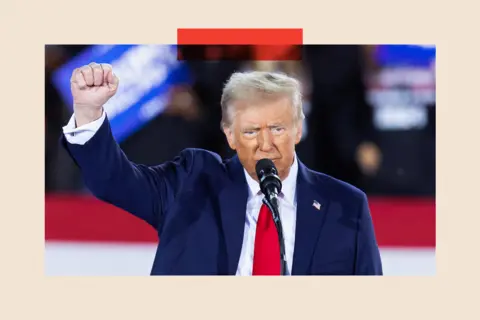 Getty Images
Getty ImagesTrump’s ditching of the Iran agreement was the triumphant end to a long campaign for Netanyahu.
In March 2019 Donald Trump went further by accepting Israel’s sovereignty over the Golan Heights, Syrian territory which Israel had occupied since the 1967 Middle East war.
Recognising Israel’s annexation of the Golan broke with a Western consensus since the aftermath of World War Two that states should not acquire territory through military action.
The new Abraham Accords
In 2020 the Trump administration gave Israel another prize. Jared Kushner brokered the Abraham Accords between Israel on one side and the United Arab Emirates, Morocco, Sudan and Bahrain. The US gave all four countries sweeteners in return for their co-operation.
They were persuaded to abandon the long-standing Arab peace initiative, that promised Israel full recognition in return for allowing Palestinians to establish their own state in Gaza, the West Bank and East Jerusalem. For Israel it amounted to a free gift.
Biden, like Trump in his first term, wanted to extend the Abraham Accords to Saudi Arabia. Recognition of Israel by the Saudis, the keeper of Islam’s two holiest shrines, the leader of the Sunni Muslim world and the richest and most powerful Arab state, would be hugely significant.
In return, the Saudis would get a comprehensive security pact with the US, which would of course include more arms deals.
It was about more than lucrative business opportunities for all concerned, though they existed and were attractive.
 Getty Images
Getty ImagesThe argument was that it would stabilise the turbulent Middle East. The US-Saudi security deal would also be a good way for Washington to outflank the Chinese, whose rise to global power includes a strong interest in the Gulf, its oil, money and strategic position.
But that left the Palestinians. The Saudis wrote and tabled the Arab peace initiative back at the turn of the century. They insist that they were not prepared to trade Palestinian rights to get a deal with Israel and the US before 7 October. But Hamas, and other Palestinians, believed that was happening.
It was the latest sign, they believed that the Palestinian cause had, as the Hamas leader and chief ceasefire negotiator Khalil al Hayya told me in Doha in October last year, “been forgotten and removed from the table”.
He said they attacked Israel 12 months earlier because “Palestinian rights aren’t being considered by anyone.
“It was necessary to raise an alarm in the world to tell them that here’s a people who have a cause and have demands that must be met. This was a blow to Israel, the Zionist enemy.”
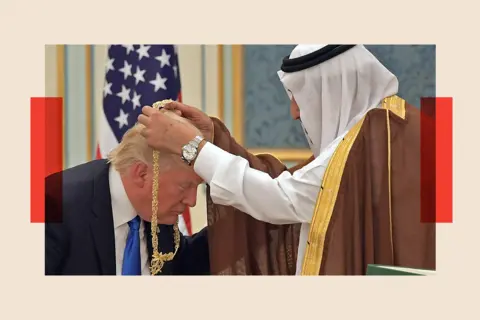 Getty Images
Getty ImagesThe Saudi Crown Prince, Mohammed bin Salman, the kingdom’s effective ruler, has accused Israel of committing genocide in Gaza.
Even so, the Saudis have made clear they are still interested in a US-brokered deal to normalise relations with Israel. Prince Mohammed’s stipulation, expressed publicly, is that his price is irrevocable progress towards Palestinian independence.
Donald Trump’s incoming national security adviser, Mike Waltz, has said already that a peace agreement between Israel and Saudi Arabia is a “huge priority” for the president.
In December he told a conservative commentator in the US that it was necessary to “eliminate these terrorist organisations”, release the hostages and move towards a deal with Riyadh.
He indicated that had Trump not lost the 2020 election to Biden, they would have made the deal by forming a common front against Iran, Saudi Arabia’s rival on the other side of the Gulf, rather than “putting the Palestinian issue right in the centre”.
Remaking the Middle East
The trouble with that approach is that Saudi Arabia has, very publicly, linked its co-operation with Palestinian rights.
The Biden administration agreed that the key to a grand bargain that could change the Middle East was not just Arab acceptance of Israel, but Israel’s acceptance of Palestinian rights.
On 14 January as he prepared to leave office, Biden’s Secretary of State Antony Blinken made that clear in a speech to the Atlantic Council in Washington. Blinken, a staunch supporter of Israel whose speech was interrupted by hecklers accusing him of genocide in Gaza, also had hard words for Israel.
“Israelis must decide what relationship they want with the Palestinians. That cannot be the illusion that Palestinians will accept being a non-people without national rights.
“Seven million Israeli Jews and some five million Palestinians are rooted in the same land. Neither is going anywhere.”
He added: “Israelis must abandon the myth that they can carry out de-facto annexation without cost and consequence to Israel’s democracy, to its standing, to its security.”
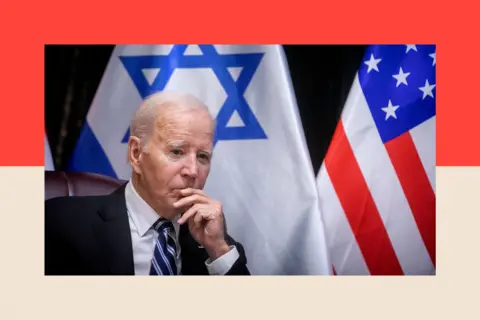 Getty Images
Getty ImagesThose de facto, cost-free annexations were exactly what many Israeli hard-right wingers were hoping Trump would allow. Perhaps he will. He is no friend of the Palestinians.
But his Western allies are already hoping that transactional Trump may be more flexible than Joe Biden – a self-proclaimed Zionist – would ever be, especially if he wants the Saudis to join the Abraham Accords.
Peace in the Middle East is perhaps the greatest prize in global diplomacy, because it is so elusive and at the moment so distant.
What price is Donald Trump prepared to accept for a deal between Saudi Arabia and Israel?
Prince Mohammed bin Salman has named his – a Palestinian state. Prime Minister Benjamin Netanyahu says that the Palestinians will never get an independent state.
Donald Trump is unlikely to be able to bully Mohammed bin Salman into changing his position. The Saudi Arabia of MBS is too assertive for that, and an invitation to Riyadh for the president of China would make the Americans nervous.
It is a time of hard choices. President Trump will have a lot to think about when he re-enters the White House after his inauguration.
Top picture credit: Getty Images
BBC InDepth is the new home on the website and app for the best analysis and expertise from our top journalists. Under a distinctive new brand, we’ll bring you fresh perspectives that challenge assumptions, and deep reporting on the biggest issues to help you make sense of a complex world. And we’ll be showcasing thought-provoking content from across BBC Sounds and iPlayer too. We’re starting small but thinking big, and we want to know what you think – you can send us your feedback by clicking on the button below.

